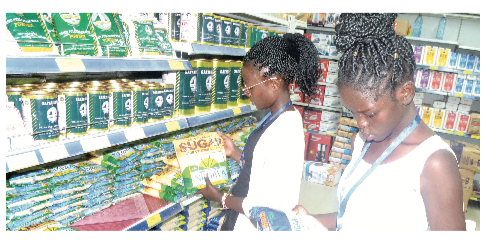Petrol prices add fuel to inflation fire

The cost of living has hit unprecedented levels after the cost of fuel surged by Sh9 whose knock-on effect has forced Kenyans to dig deeper into their pockets.
At a time when consumers are reeling from the inflation that has accelerated to 7.1 per cent in May, from 6.5 per cent in the previous month – the highest since February of 2020 – the cost of basic products continues to rise each day.
Data from the Kenya Economic Update 2022 shows that between November 2021 and March 2022, households that said they were unable to access staple food were 36 per cent.
In June last year, with Sh1,000, you could buy a 2kg packet of maize flour, 1kg of rice, 2kg wheat flour, 1 litre of cooking oil and 1kg of beef.
However, with the same amount this year, you can only purchase a kilo of meat, 2kg maize flour and a 2kg packet of wheat flour and remain with Sh20.
The situation is bound to get worse with increase in the price of fuel. Consumers in Mombasa say barely two days after the Energy and Petroleum Regulatory Authority (EPRA) announced increase in fuel prices in its monthly review, consumers began to feel the pinch of high cost of commodities.
Traders at the Kongowea open air market said food prices had hit new highs.
David Mutegi, an onion trader at the market, said food prices at the market had doubled owing to the cost of transport.
“Circumstances have forced us to increase the food prices to cater for the transport costs, a sack of onion sourced from Tanzania was being transported at a cost of Sh60,000 however as we speak the price has doubled and we are forced to pay Sh120,000,” said Mutegi.
A spot check at Kongowea market revealed that the cost of a 70kg crate of tomato, which was going for Sh3,500 before, had shot up to Sh4,500.
A 120-kg crate of tomato now goes for Sh8,500 up from Sh6,500 before the fuel prices went up.
“The suppliers of these products have increased prices, and we are also forced to increase the prices to cater for the transport cost. We do not know if the supply will be sustained anymore since consumers cannot afford expensive commodities. We were selling four tomatoes for Sh20 however the price has shot up to Sh50 and our customers are staying away,” said Irene Mwende, a tomato seller.
A sack of potatoes that was being sold for Sh8,000 previously is now going for Sh10,000.
Some residents of Mombasa have now opted to walk to work following an increase in fares by public service vehicles, with some matatu routes doubling charges.
“A distance which we used to pay Sh50, we are now being charged Sh100. We are unable to pay this amount and we have decided to trek to work,” said Ali Mohammed.
Matatu industry stakeholder said they had been forced to increase fares due to the high costs of fuel and cost of living.
“Over the past two days we have raised fares to cushion drivers from the impact of rising fuel prices, and we have been forced to ask customers hailing Uber rides to cancel them since we are unable to cushion ourselves from the rising fuel prices,” said a Uber driver James Njoroge.
Russia war
A spot check in a number of supermarkets in Siaya, Homa Bay, Migori and Kisumu counties established that prices of basic commodities had gone up dramatically.
Prices of household goods such as maize flour, wheat flour, sugar, cooking oil, milk and detergents had nearly doubled in less than a month.
Some food items which last month cost as low as Sh130 now cost between Sh200 to Sh210, a 70 per cent increase.
Kenya, like the rest of the world, is grappling with the effects of the Covid-19 and climate change which have affected food production and the supply chain.
There is also the Russia-Ukraine conflict, which continues to affect the global economy—including food production and the supply chain.
Almost 30 per cent of global wheat and barley comes from Russia and Ukraine, and Ukraine is also a huge producer of sunflower palm and corn oils, which Kenya imports in bulk.
A 400 grams loaf of bread is now retailing at Sh70 up from Sh50 while a 2kg of maize flour in supermarkets costs about Sh200 up from Sh130.
Traders in the Kusumu’s Kibuye market decried the high costs.
“We also buy the products at a high cost so we have to bear the costs to make a profit,’’ said a trader Jane Anyango.
Most consumers appealed to the government to lower prices of basic commodities.
“We are wondering what is happening that prices keep rising each month,’’ said Tobias Ouma.
Mary Atieno wondered why almost every day, they wake up to higher prices.
The latest World Bank report revealed that close to a fifth of Kenyan families cannot afford a decent meal due to a sharp increase in food prices.
Cooking oil
In a span of one year, some basic foodstuff prices have doubled. Cooking oil has been one of the commodities that have created a storm in the pockets of Kenyans with its price doubling over a period of 12 months.
The rise in prices of cooking oil has been blamed on Covid-19, the ongoing conflict in Ukraine and a deficiency of dollars, which has seen at least two Kenyan oil manufacturers reduce operations due to the inability to pay suppliers and obtain raw materials.
A litre of cooking oil branded Avena retailed at Sh228 last year, but after a 97 per cent rise, consumers are now parting with Sh450.
A 2kg packet of maize flour which retailed for Sh105 last year is now going for Sh200, a 90 per cent rise in price.
In the same period, the price of a 2kg packet of wheat flour rose from Sh131 to Sh215, a 64 per cent increase.
The rise came in the wake of the Russian invasion into Ukraine that paralysed the global supply of the commodity.
About 66 per cent of wheat that Kenya imports come from the two countries and the current war has seen the price of a 400g loaf of bread rise to Sh60 from Sh50.
The cost of rice also rose by 55 per cent, with a kilogram of Sindano rice now retailing at Sh170.
The hitches in fuel supply have also further exacerbated the situation with a litre of Super petrol, diesel and Kerosene now going for Sh159, Sh140 and Sh128 respectively. In 2021, Super petrol went for Sh126, diesel Sh109 and kerosene Sh100.
The trend continued with a 16 per cent imposition of VAT on cooking gas that pushed the prices of a 13-kg gas cylinder to Sh3,500.
It took the intervention of Parliament to reduce the VAT to 8 per cent with the commodity now retailing at Sh3,100 from Sh2,280 last year.
The cost of meat has also been impacted as one kilogram of beef and matumbo (offals) have recorded 18 per cent and 25 per cent increase respectively.
From Sh475 for a kilogram of beef last year, Kenyans are now paying Sh560 while matumbo costs Sh350 a kilogram, up from 280 last year.
Locally produced goods have also not been spared, with a 500ml packet of milk rising by 51 per cent to Sh75.
—Reporting by Jacktone Lawi, Kepher Otieno and Sophie Njoka









